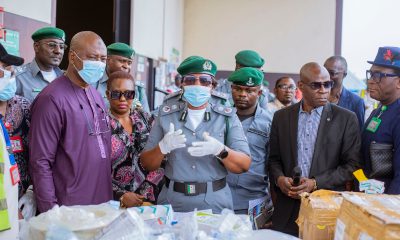Health
Buhari Should Probe Missing N3.8bn in Health Ministry, NAFDAC—SERAP

By Adedapo Adesanya
The Socio-Economic Rights and Accountability Project (SERAP) has urged President Muhammadu Buhari to direct the Attorney General of the Federation and Minister of Justice, Mr Abubakar Malami and the appropriate anti-corruption agencies to probe allegations that N3,836,685,213.13 of public funds meant for the Federal Ministry of Health, teaching hospitals, medical centres, and National Food Drug Administration and Control (NAFDAC) was missing, mismanaged, diverted or stolen.
In a letter dated January 2, 2021, and signed by SERAP Deputy Director, Mr Kolawole Oluwadare, the organisation said the allegations are documented in Part 1 of the 2018 audited report released last week by the Office of the AGF.
The organisation also urged him to “promptly investigate the extent and patterns of widespread corruption in the Federal Ministry of Health, teaching hospitals, medical centres, neuro-psychiatric hospitals, National Health Insurance Scheme, and NAFDAC indicted in the audited report, and to clean up an apparently entrenched system of corruption in the health sector.
“Corruption in the health sector can cause serious harm to individuals and society, especially the most vulnerable sectors of the population. These missing funds could have been used to provide access to quality healthcare for Nigerians, and meet the requirements of the National Health Act, especially at a time of the COVID-19 pandemic,” it said.
According to SERAP, “The Federal Ministry of Health, Abuja spent without approval N13,910,000.00 to organise a 2-day Training and Bilateral discussion with Chief Medical Directors and Chairmen Medical Advisory Council and the Ministry of Budget and National Planning to prepare 2019 Personnel Budget N4,860,000.00 was originally budgeted for the programme.”
SERAP said: “The National Food Drug Administration and Control (NAFDAC) paid N48,885,845.00 for services not rendered and goods not supplied. According to the Auditor-General, NAFDAC used fake and fictitious receipts for these payments. NAFDAC also paid N25,734,018.49 to companies/firms who were never awarded any contracts and never executed them.”
The letter, read in part: “Investigating and prosecuting the allegations of corruption by these institutions would improve the chances of success of your government’s oft-repeated commitment to fight corruption and end the impunity of perpetrators, as well as serve the public interest.”
“Any failure to promptly investigate the allegations and prosecute suspected perpetrators, and to recover the missing public funds would breach Nigeria’s anti-corruption legislation, the Nigerian Constitution of 1999 (as amended), the UN Convention against Corruption, and the International Covenant on Economic, Social and Cultural Rights to which Nigeria is a state party.”
“Similarly, the Neuro-Psychiatric Hospital Management Board Aro-Abeokuta, Ogun State failed to account for N28,662,265.32, which was to be used to procure drugs, implants, and other inputs, as approved by the Federal Government. The Auditor-General wants the money returned to the treasury.”
“The National Health Insurance Scheme spent N355,510,475.00 on projects between 2016 and 2017 without appropriation. The Scheme also spent N32,299,700.00 to provide ‘financial medical assistance’ to individuals who have not been enrolled into the scheme (NHIS).”
“The Scheme also spent N72,383,000.00 on verification exercise without any supporting documents. The Scheme awarded contracts of N66,798,948.12 to members of staff for procurements, instead of making the procurement through the award of contracts.”
“The Federal Neuro-Psychiatric Hospital Enugu, Enugu State paid N5,200,000.00 as salary advance to the Medical Director. However, the Medical Director was neither proceeding on transfer, on posting nor on the first appointment to qualify for a salary advance. The Auditor-General is asking the Medical Director to refund the money collected. Another N3,387,139.00 is said to be missing but the Hospital management has failed to report the case, or recover the money.”
“The Irreal Specialist Teaching Hospital, Irrua Edo State paid N58,829,426.84 to two contractors for supplies and installations but without payment vouchers.”
“Also, Jos University Teaching Hospital Jos, Plateau State failed to remit N333,386,549.15 being 25% of its internally generated revenue of N1,333,546,196.60 to the Consolidated Revenue Fund. The Hospital also failed to account for N8,572,777.25.”
“The Lagos University Teaching Hospital, Lagos, failed to remit N945,422,478.23 to the appropriate tax authority. The Hospital also failed to remit N237,007,828.05 to the Consolidated Revenue Fund, and failed to remit N22,307,735.21 being withholding tax deducted from contracts in 2018.”
“The Federal Medical Centre, Owerri, Imo State also failed to remit N8,519,506.75 being 25% of its internally generated revenue to the Consolidated Revenue Fund. The Medical Centre also spent N542,877,312.77 as personnel cost between 2015 and 2016 instead of N12,761,350,337.00 appropriated for the same period.
“The Medical Centre failed to account for N898,076,719.14 of its internally generated revenue, and failed to account for N23,598,074.38 of personnel cost. The National Primary Health Care Development Agency, Abuja spent without approval N19,564,429.91 as estacode allowance to the various staff of the agency.”
“The Federal School of Occupational Therapy, Oshodi, Lagos failed to remit N3,250,962.98 of its internally generated revenue for 2018 to the Consolidated Revenue Fund. The School also failed to remit N4,018,252.81 being funds deducted from various contracts. It spent N10,507,393.00 without any appropriation or approval.”
“The Federal Medical Centre, Keffi Nasarawa State failed to remit N2,147,036.00 of its internally generated revenue to the Consolidated Revenue Fund. It also failed to remit N5,810,438.05 to the Federal Inland Revenue Service.”
“The Medical and Dental Council of Nigeria failed to remit N68,604,040.68 of its internally generated revenue to the Consolidated Revenue Fund.”
“Allegations of corruption in the health sector undermine public confidence in the sector, and obstruct the attainment of commitments made through Sustainable Development Goals, in particular Goal 16 to create effective and accountable institutions.
“The allegations also show that Nigeria is failing to fulfil the obligations to use its maximum available resources to progressively realize and achieve basic healthcare services for Nigerians.”
“We would be grateful if your government would indicate the measures being taken to address the allegations and to implement the proposed recommendations, within 14 days of the receipt and/or publication of this letter.”
“If we have not heard from you by then as to the steps being taken in this direction, the Registered Trustees of SERAP shall take all appropriate legal actions to compel your government to implement these recommendations in the public interest, and to promote transparency and accountability in the health sector.”
Health
Union Disrupts NAFDAC Operations in Lagos Over Sachet Alcohol Ban

By Adedapo Adesanya
Members of the National Union of Food, Beverage and Tobacco Employees protested at the Lagos office of the National Agency for Food and Drug Administration and Control (NAFDAC), disrupting operations in reaction to the ban on sachet alcohol.
The protesting union members barricaded the agency’s premises in Isolo, meaning staff who arrived early to resume duty were forced to remain outside the complex.
Recall that NAFDAC has continued the ban on alcoholic beverages sold in sachets and PET bottles below 200 millilitres, despite calls from certain quarters, including the picketers.
The union is demanding the immediate unsealing of affected factories and production lines, warning that sustained enforcement of the policy could trigger significant economic consequences across the industry.
It is the second time this month that union members disrupted the Lagos NAFDAC office over what they described as the agency’s refusal to comply with an alleged federal government directive to suspend enforcement of the ban on the production and sale of alcoholic beverages in sachets.
The union claimed that directives had been issued by the Office of the Secretary to the Government of the Federation and the Office of the National Security Adviser, calling for the suspension of enforcement and the reopening of sealed production lines.
However, NAFDAC dismissed the claims, maintaining that it had not received any official instruction from the Federal Government to halt enforcement of the ban on sachet and PET-bottled alcohol.
Meanwhile, police officers were later seen at the NAFDAC Isolo premises, which dispersed the blockade to allow NAFDAC staff back into the premises.
Representatives of the Director-General of NAFDAC later engaged the protesting union in talks, but the meeting ended without resolution as demonstrators insisted their agitation would continue.
Union leaders presented their concerns during closed-door discussions with a director within the agency and the Special Assistant to the Director-General. However, no agreement was reached.
The protesters are urging NAFDAC to reconsider what they describe as the strict enforcement of the ban on sachet alcohol. Instead, they want the agency to focus on regulating access to such products, particularly by restricting sales to minors, while intensifying public enlightenment campaigns on responsible consumption.
Despite this, protesters say they will not stop until their demands are addressed.
Health
Modern Veterinary Clinics For Advanced Pet Care

As companion animals live longer and owners expect more from routine care, modern veterinary clinics have evolved into centers offering advanced diagnostics, specialty surgery, and integrative therapies. For busy professionals juggling work, travel, and online business demands, knowing which clinic delivers comprehensive care is essential. Frisco vet services illustrate how these modern practices combine cutting-edge technology, multidisciplinary expertise, and client-focused workflows. This article outlines the infrastructure, service offerings, and decision criteria that indicate a clinic capable of providing contemporary, evidence-based care while keeping visits efficient and stress-free for both pets and owners.
What Defines A Modern Veterinary Clinic
A modern veterinary clinic is defined less by a single piece of equipment and more by an integrated approach that combines up‑to‑date technology, specialized staff, and clinic design that prioritizes safety and comfort. These clinics treat animals with complex conditions, run efficient workflows, and communicate transparently with owners.
Key Infrastructure And Technology Investments
Contemporary clinics invest strategically in diagnostic and treatment modalities that materially change outcomes: digital radiography for rapid imaging, in‑house laboratories for same‑day blood work, ultrasound for real‑time organ assessment, and advanced surgical suites with anesthesia monitoring. Investment also includes infection‑control systems, reliable HVAC, and sterilization equipment. These capital decisions reduce turnaround time for diagnoses and support complex procedures that previously required referral.
Staffing, Specialization, And Continuing Education
Staffing reflects clinical ambition: veterinarians with specialty training (DACVS, DACVIM, DACVECC), certified veterinary technicians, and support staff trained in low‑stress handling. Modern clinics often host visiting specialists or maintain referral relationships with tertiary centers. Importantly, clinics that prioritize continuing education schedule regular training, subscribe to current literature, and engage in case reviews, actions that keep protocols current and improve outcomes.
Clinic Design For Safety, Flow, And Comfort
Design matters. Logical patient flow minimizes cross‑contamination and stress: separate entrances for healthy and sick patients, dedicated isolation wards, and distinct surgical zones. Comfortable client areas, clear signage, and private consultation rooms improve communication and compliance. For pets, non‑slip surfaces, quiet recovery areas, and pheromone‑friendly environments reduce anxiety, which in turn improves diagnostic accuracy and post‑procedure recovery.
Advanced Diagnostic Capabilities
Diagnostics are the backbone of modern pet care. Faster, more precise tests enable tailored treatment plans and earlier interventions.
Advanced Imaging: Digital X‑Ray, Ultrasound, CT, And MRI
Digital X‑ray provides high‑resolution images with immediate availability and easier sharing for remote consults. Ultrasound is indispensable for soft‑tissue evaluation and guided biopsies. CT and MRI, once exclusive to academic centers, are now present in many referral clinics, allowing detailed assessment of complex fractures, thoracic disease, neurologic conditions, and staging of cancer. Image quality and interpretation, often augmented by teleradiology, lead to more confident surgical planning and prognostication.
Laboratory, Point‑Of‑Care Testing, And Genomic Diagnostics
In‑house labs produce same‑day CBCs, chemistry panels, and cytology, accelerating decision‑making. Point‑of‑care tests for infectious agents, endocrine disorders, and clotting function add convenience without sacrificing reliability. Genomic diagnostics, from breed‑specific risk panels to tumor genomics, are increasingly accessible, enabling targeted therapies and risk stratification for hereditary conditions.
How Diagnostics Inform Preventive Care And Personalized Medicine
Diagnostics underpin preventive medicine: heartworm antigen tests, thyroid screening, and wellness blood panels reveal problems before clinical signs appear. Personalized medicine emerges when diagnostics inform individualized vaccination schedules, dietary plans, or monitoring frequency. The result: care that reduces emergency visits and improves long‑term quality of life.
State‑Of‑The‑Art Surgical And Interventional Services
Surgery in modern clinics spans routine spays and neuters to complex orthopedic reconstructions and image‑guided interventions.
Minimally Invasive, Laser, And Image‑Guided Procedures
Minimally invasive techniques, arthroscopy, laparoscopy, and endoscopy, reduce pain, shorten hospital stays, and speed return to function. Laser surgery provides precision and reduced bleeding for soft‑tissue procedures. Image‑guided interventions, such as CT‑guided biopsies or fluoroscopy for foreign body retrieval, allow targeted treatments that were once riskier or impossible.
Anesthesia, Pain Management, And Perioperative Safety
Anesthesia protocols are more nuanced today: individualized drug selection, multimodal analgesia, regional blocks, and continuous monitoring (ECG, capnography, pulse oximetry) improve safety. Preoperative assessment, including risk stratification and optimization of comorbidities, reduces complications. Recovery protocols emphasize early mobilization and aggressive pain control to prevent chronic pain syndromes.
Postoperative Rehabilitation And Recovery Protocols
Rehabilitation is an expected component of surgical care. Physical therapy, hydrotherapy, and tailored exercise plans reduce muscle atrophy and improve joint function. Clinics often provide home‑care instructions and scheduled reassessments to track progress and adjust protocols. These programs turn good surgical outcomes into durable functional gains.
Petfolk Veterinary & Urgent Care – Frisco
Advanced Therapeutics And Specialty Treatments
Beyond diagnostics and surgery, modern clinics deliver advanced therapeutics that extend and improve life quality.
Regenerative Medicine: Stem Cells And PRP
Regenerative modalities like mesenchymal stem cell therapy and platelet‑rich plasma (PRP) injections aim to stimulate healing in tendon, ligament, and osteoarthritic conditions. While still an evolving field, controlled studies and clinical experience show promising functional improvements for select patients. Clinics offering these therapies combine careful case selection with measurable outcome tracking.
Oncology, Neurology, Cardiology, And Other Specialties
Specialty services allow complex, multidisciplinary care. Veterinary oncologists provide staging, chemotherapy, and radiation planning: neurologists manage seizure disorders and spinal disease: cardiologists use echocardiography and interventional procedures for congenital heart defects. Integration with imaging and lab diagnostics enables cohesive care pathways that mirror human tertiary centers.
Integrative Therapies: Physical Rehab, Acupuncture, And Nutrition
Integrative care recognizes the value of adjunctive treatments. Acupuncture and targeted nutrition plans complement medical therapy for chronic pain and mobility issues. Nutritional counseling, including therapeutic diets for renal, cardiac, or dermatologic disease, is standard in clinics focused on long‑term outcomes.
Improving Pet And Client Experience With Technology
Technology enhances both clinical care and client experience, especially for owners who need efficient, transparent services.
Telemedicine, Remote Monitoring, And Virtual Follow‑Ups
Telemedicine extends access for triage, follow‑ups, and behavioral consultations. Remote monitoring devices, activity trackers, continuous glucose monitors, and wearable ECGs, provide objective data between visits. Virtual follow‑ups reduce travel burdens and let clinicians adjust care in real time, improving adherence and satisfaction.
Electronic Medical Records, Client Portals, And Scheduling Tools
Electronic medical records (EMRs) streamline documentation and support coordinated care. Client portals give owners access to vaccination histories, lab results, and discharge instructions. Integrated scheduling and automated reminders decrease no‑shows and improve preventive care compliance, a benefit both to clinics and busy clients.
Pain Management, Behavior‑Based Care, And Low‑Stress Handling
Client experience is inseparable from pet comfort. Modern clinics train staff in low‑stress handling techniques and behavior‑based protocols that reduce fear and aggression. Transparent pain‑management plans, clear cost estimates, and follow‑up communications foster trust and better outcomes.
How To Choose The Right Modern Clinic For Your Pet
Choosing a clinic requires practical criteria and an understanding of trade‑offs between convenience, specialization, and cost.
Questions To Ask: Credentials, Equipment, And Outcomes
Prospective clients should ask about specialist credentials, the availability of imaging and lab services, and the clinic’s approach to anesthesia and pain control. Request examples of similar cases and expected outcomes. A clinic that welcomes such questions is often more transparent and results‑oriented.
Cost, Insurance, And Referral Pathways
Advanced care carries higher costs. Discuss fee structures, payment options, and whether the clinic works with pet insurance. Understand referral pathways: does the clinic refer to or host board‑certified specialists? Clear referral and co‑management policies indicate maturity and a networked approach to care.
Evaluating Reviews, Accreditation, And Collaboration With Primary Vets
Look for consistent reviews that mention communication, follow‑up, and outcomes rather than isolated flashy cases. Accreditation (AAHA in the U.S.) or affiliation with universities can signal adherence to higher standards. Finally, the best specialty clinics collaborate with primary care veterinarians, ensuring continuity rather than competition.
Conclusion
Modern veterinary clinics for advanced pet care combine technology, specialization, and thoughtful design to deliver better diagnostic accuracy, safer surgeries, and more personalized therapies. Pet owners benefit when clinics pair capabilities with clear communication, transparent costs, and collaborative care models. For professionals, including small business owners and busy entrepreneurs who value efficient, outcome‑driven services, selecting a clinic that integrates advanced diagnostics, robust perioperative care, and client‑centric technology yields the best chance for sustained pet health. As veterinary medicine continues to mirror human healthcare in capability and complexity, informed choices and trusted partnerships between owners and clinics will determine the real value of those advances.
Health
Oyo Seals Ar-Rahmon Khabul Herbal Over Health Concerns

By Modupe Gbadeyanka
An Ibadan-based herbal company, Ar-Rahmon Khabul Herbal Nigeria Limited, has been sealed by the Oyo State Rule of Law Enforcement Authority (OYRLEA).
The state government, in a statement signed on Friday by the Commissioner for Information, Mr Dotun Oyelade, revealed that the herbal firm was shut down due to environmental violations and public health concerns.
The leader of OYRLEA, Mrs Aderonke Aderemi, explained that the action was taken after multiple petitions from residents alleging persistent offensive odour and health challenges linked to the company’s operations.
She noted that the state government swung into action “to protect public health, preserve environmental standards, and enforce regulatory compliance across the state.”
It was gathered that investigations identified tobacco leaf as a major component in its production process, generating a strong, putrid odour deemed hazardous to residents and capable of posing serious health risks to the surrounding community.
“Joint inspections by officials revealed that the company operates a herbal production facility within a densely populated residential area, in clear violation of environmental and public health standards,” the statement said, adding that further findings from the inspection include the emission of harmful and toxic gaseous substances into the atmosphere, the discharge of wastewater into a nearby community water body, the installation of a chimney deemed too short and directly facing residential buildings, and the accumulation of solid waste within the premises despite claims of engaging a waste contractor, among others.
Prior to the enforcement action, the agency had issued an abatement notice directing the company to cease operations and relocate within 21 days in accordance with the Oyo State Environmental, Sanitation and Waste Control Regulations.
OYRLEA, along with the agencies that carried out the enforcement, reiterates that air pollution, hazardous waste discharge, and improper waste management are violations of environmental laws.
Mrs Aderemi reaffirmed OYRLEA’s commitment to sustained monitoring and enforcement to ensure a safe and healthy environment for all residents.
-

 Feature/OPED6 years ago
Feature/OPED6 years agoDavos was Different this year
-
Travel/Tourism10 years ago
Lagos Seals Western Lodge Hotel In Ikorodu
-

 Showbiz3 years ago
Showbiz3 years agoEstranged Lover Releases Videos of Empress Njamah Bathing
-

 Banking8 years ago
Banking8 years agoSort Codes of GTBank Branches in Nigeria
-

 Economy3 years ago
Economy3 years agoSubsidy Removal: CNG at N130 Per Litre Cheaper Than Petrol—IPMAN
-

 Banking3 years ago
Banking3 years agoSort Codes of UBA Branches in Nigeria
-

 Banking3 years ago
Banking3 years agoFirst Bank Announces Planned Downtime
-

 Sports3 years ago
Sports3 years agoHighest Paid Nigerian Footballer – How Much Do Nigerian Footballers Earn


















